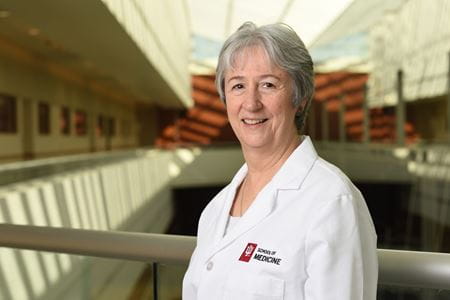More than a billion people worldwide struggle with musculoskeletal conditions. From arthritis to back pain, these ailments are the second-leading cause of disability, and have the fourth-greatest impact on the overall health of the world population, according to the United States Bone and Joint Initiative.
Investigators at the Indiana Center for Musculoskeletal Health at Indiana University School of Medicine are working to drive those numbers down, particularly among the aging population, with the support of a grant from the National Institutes of Health (NIH).
The five-year grant award from the National Institute on Aging at the NIH is expected to total more than $10.4 million. It will support research by IU School of Medicine investigators, along with their counterparts at the University of Missouri-Kansas City and University of Texas at Arlington.
Center director Lynda Bonewald, PhD, will lead the multi-institution study aimed at showing how communication between muscle and bone can affect overall health. The team is particularly interested in developing therapies for osteosarcopenia, a condition marked by the loss of both bone density and muscle mass and which is common among older people.
“Musculoskeletal conditions are the leading cause of medical costs in this country. It’s more than if you combine cancer and heart disease,” said Bonewald, who was tapped by IU School of Medicine in 2016 to build the Center for Musculoskeletal Health. “What we hope to accomplish is to understand muscle and bone crosstalk so we can develop new therapeutics that will prevent osteosarcopenia.”
When bone and muscle work together they secrete factors—good factors are produced during exercise, for example, while bad factors can be caused by inactivity. One good factor produced by this bone-muscle crosstalk is the metabolite beta aminoisobutyric acid (BAIBA). An exercise-induced muscle factor, BAIBA was shown in studies to stop bone and muscle loss in inactive mice.
“What we’re doing in the lab is combining sub-optimal exercise with BAIBA, and we’re showing that it synergizes to increase bone mass,” Bonewald said. “So what this means is you could take a few minutes and do a small amount of exercise and get the same effect on bone as if you did a more intense workout.”
Bonewald hopes that by learning to understand the biochemical communication between muscle and bone, investigators can tackle not only musculoskeletal issues plaguing aging populations, but also have positive impacts on numerous diseases and conditions.
For cancer patients, whose bodies suffer the damaging effects of chemotherapy treatments, the positive effects of BAIBA could mean a faster recovery and increased quality of life.
“These patients try to bounce back and do the things they did before the chemotherapy, but they just can’t. That’s because a lot of the therapies that we’re using are doing terrible things to the muscle and bone,” Bonewald said. “We need to figure out a way to maintain musculoskeletal health while we’re killing the cancer. This could help with that.”
IU School of Medicine established the Indiana Center for Musculoskeletal Health in 2017. The center builds on the school’s internationally recognized strengths in bone biology and includes a multidisciplinary team of researchers focused on making discoveries that translate into improved care for patients with a wide range of illnesses and injuries.
“We are delighted with the early successes of this center,” said Jay L. Hess, MD, PhD, MHSA, IU’s executive vice president for university clinical affairs and dean of the School of Medicine. “This large grant speaks to the importance of the work taking place within the center and underscores IU School of Medicine’s tremendous potential to benefit patients who suffer from musculoskeletal conditions related to aging and other diseases.”
The research is supported by the National Institute on Aging of the National Institutes of Health under Award Number P01AG039355. The content is solely the responsibility of Indiana University School of Medicine and does not necessarily represent the official views of the National Institutes of Health.




